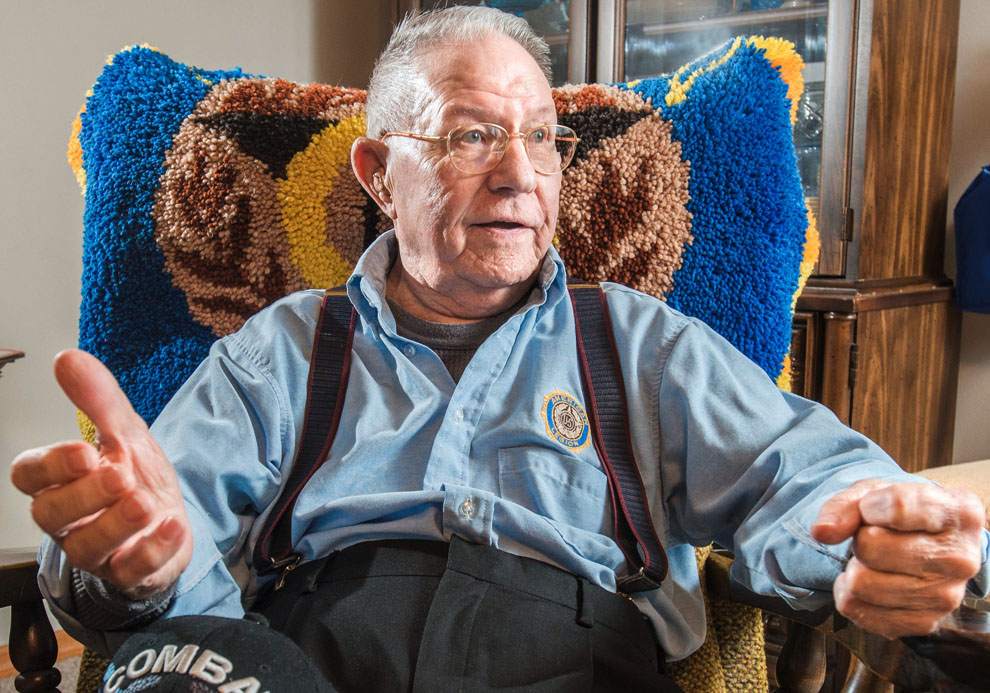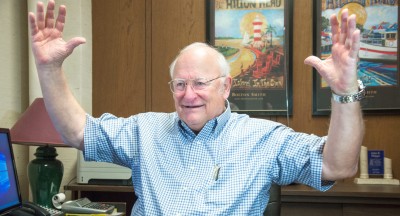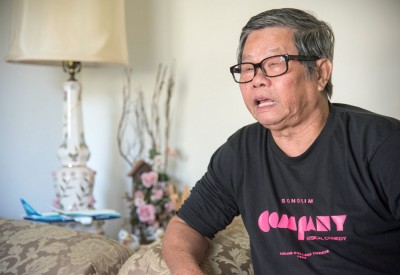Clay Lofton
By Paul Wood

Photo By Robin Scholz/The News-Gazette
CHAMPAIGN — Clay Lofton served in World War II and Korea, both times manning a .30-caliber Browning water-cooled machine gun.
The Bronze Star winner had a completely different experience in each war, though.
“In the Philippines, we were mostly advancing,” the veteran says of his World War II experience in the Pacific Theater, where he won the Bronze Star for a series of acts of heroism.
In Korea, where he won the less-enviable Purple Heart after getting frostbite on his hands and feet, it was quite different.
“We’d take a hill one day and then lose two hills on another day,” says Lofton, 89, who went on to a long career of 34 years at the University of Illinois as a storekeeper and supervisor.
He and his wife Irene and daughters Sharon and Pam have also been also nationally important leaders of the American Legion and its auxiliary.
But it was on the hills of war that Lofton first made his mark.
Infantry rarely fights on level ground, Lofton said.
It is the assault force of the services, taking high ground and massing different types of weaponry and specialized troops, with units of tanks, small arms and heavy machine guns, Lofton said.
From his boyhood in St. Joseph and his job at Grab It Here, a cash and carry grocery store in Champaign, Lofton was drafted into the Army and sent for 15 weeks of basic training that marked his debut as a machine gunner.
His unit was outfitted with uniforms suited for the European Theater, made of heavy wool.
The infantry troops melted in those uniforms when they found themselves instead in places like Leyte and Mindanao, the Philippines.
Lofton was one of four men who carried the Browning .30-caliber machine gun, which was water-cooled and heavy enough to require a tripod.
One of the four men had to supply water, usually from a nearby river, Lofton said. A water-filled jacket surrounded the barrel, which could also be changed when it got too hot.
As he advanced to become the gunner, Lofton had to feed the belt of bullets through the gun while holding back its tendency to go forward, he said.
The machine gun had a long run from World War I through Korea, Lofton said.
He returned to the United States in 1946, eventually marrying his wife Irene and raising two daughters.
But while he was still single, he joined the Army Reserves, and later found himself first in Japan, then in Korea.
Early in the Korean war, Lofton said, U.S. and allied forces moved northward toward the North Korean border, but as they approached the Yalu River, on the border between China and North Korea, his world changed entirely — with a massive influx of Chinese troops in October 1950.
“A lot of us were right on the Yalu. You could see the Chinese massing for assault,” he recalls.
Suddenly, his gun crew found itself repeatedly in danger of being overrun by the sheer number of Chinese troops, Lofton said. “I can remember that you looked ahead of you and all you could see was Chinese troops, less than a mile away.”
Was he scared? “I became more alert, more cautious,” Lofton says.
The cold took a toll on him, in part because the Army improperly issued rubber boots with felt liners that led to frostbite, and he earned a Purple Heart for his injuries.
Lofton came home in 1951 and worked in Paxton before finding a long-term home at the Urbana campus. He retired in 1986. Long after his service, the Korean government gave him a medal.
Nowadays, U.S. troops are better trained and have better equipment, he said.
“I think we have excellent troops,” he says of today’s soldiers.
“Our enemies are getting better, too,” he adds sadly.
Do you know a veteran who could share a story about military service? Contact staff writer Paul Wood at pwood@news-gazette.com.
Read more stories from local veterans:
 John Phipps
CHAMPAIGN — During the Berlin Wall crisis in 1961, John Phipps was working as the Air Force base provost marshal, in cha …
John Phipps
CHAMPAIGN — During the Berlin Wall crisis in 1961, John Phipps was working as the Air Force base provost marshal, in cha …
 Eric Swenson
PAXTON — In Ar-Ramadi, Iraq, as part of the 2007 surge, Eric Swenson was on a base that was attacked three or four times …
Eric Swenson
PAXTON — In Ar-Ramadi, Iraq, as part of the 2007 surge, Eric Swenson was on a base that was attacked three or four times …
 Bon Bui
URBANA — Wounded six times in battle, Major Bon Bui spent 13 years starving in a prison and being “re-educated” in commu …
Bon Bui
URBANA — Wounded six times in battle, Major Bon Bui spent 13 years starving in a prison and being “re-educated” in commu …